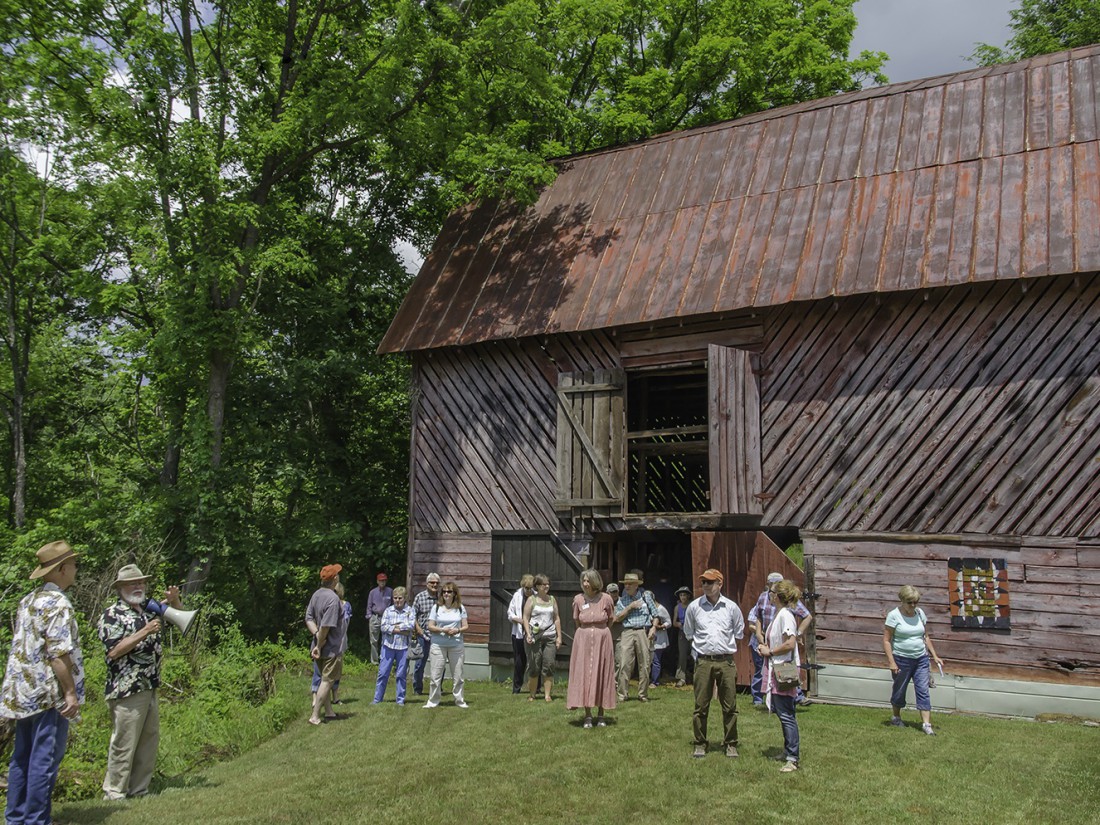There are at least 10,000 barns in Madison County, according to a conservative estimate by the Appalachian Barn Alliance — that’s roughly one barn for every two people in the area. It’s already a shocking figure, but the organization’s lead researcher, architect Taylor Barnhill, says a more realistic estimate would near 20,000 or 30,000 barns. Many people quote a lower barn-count estimate, “because they really can’t believe how many barns there are here,” Barnhill says. His countywide study averages about five barns per mile of county road. At 3,800 miles of county roads, that’s 19,000 barns at least, and, “That doesn’t count all the barns up all these hollers and private roads that you can’t see from a county road,” he says.
To celebrate that particular crop, the Appalachian Barn Alliance hosts Barn Month 2016, a series of events surrounding the third annual Barn Day on Saturday, May 21. The festivities kick off Friday, May 6, with the opening reception of The Barns of Madison County exhibit at The Madison County Arts Center.
The Appalachian Barn Alliance, founded in 2012, is working to brand the county as the barn capital of North Carolina. “Madison County was the largest producer of burley tobacco, so consequently we have more barns than any [other] county in the state,” say Sandy Stevenson, president of the Appalachian Barn Alliance and one of its founding members. “When I drive home, in five miles, there are easily 30 barns that I see.” Set within the steep mountain landscape, those structures become visual punctuation marks that are both an inspiration for artists and a curiosity for tourists.
While the organization is interested in barn preservation, it’s focused on achieving that through photography, architectural drawings and documentation of oral histories. (This month’s Barn Month events include a showing of historical photographs and a photo preservation workshop.)
Due to the present decline in agriculture and the end of the tobacco subsidy in 2004, barns are falling into abandonment and disrepair. Barnhill says that many barns, including his own, have become storage units. “Now they have old sewing machines and old beds and video game consoles and old TVs. You name it,” he says. Once functional structures, the buildings now serve as a kind of timeline of the county’s agricultural history.
“In the mountains, everybody thinks they’re all tobacco barns,” says Barnhill. “We had a whole century of settlement and barn history in the mountains prior to tobacco.” A longtime resident of Madison County, he is slowly compiling his research into a book.
“[In] the first century of farming in the southern Appalachian mountains, the barns were more related to livestock and storage of tools and implements,” Barnhill says. Then from 1870 to about 1920, the barns were designed for flue-cured tobacco — typically airtight log buildings that were heated to dry the leaves. Agriculture then shifted to burley tobacco, which was dried through air circulation. The flue-cured tobacco barns were retrofitted for the burley tobacco crop by removing the mud chinking between the logs to allow for better airflow.
“It’s all a story about sustainability before they called it sustainability,” says Barnhill. “It was just making good use of what resources they had.”
Barn Day — a chance to visit the celebrated barns — is an annual fundraiser for the Appalachian Barn Alliance. This year’s guided tour will be at James and Geneva Roberts’ farm, followed by a followed by dinner, catered by Chupacabra Latin Cafe, and silent auction.
Another event during Barn Month will be an open house at Root Bottom Farm, home to a barn in recovery. When Sarah Jones Decker and her husband purchased their property in 2011, the old tobacco barn was missing boards, had derelict patches and was filled with accumulated storage that was piled nearly two stories high. Collaborating with Asheville-based woodworker Jon Taylor on a massive renovation project, the refurbished structure — once used for drying tobacco — now boasts the farm’s 13 varieties of garlic hanging from its rafters to dry.
“Today, the barn is a huge part of our small organic farm operation,” Jones Decker says in documentation of the restoration process, posted on the farm’s website. “We use the barn every day for washing and drying vegetables, storing tools, and when we need shelter from the summer heat and afternoon rainstorms that frequent our mountainous county.” What was once an eyesore has returned to its role as a functional structure. Decker sees the barn, which she’s named The Garlic Pearl, entering into its second life.



Where is Root Bottom Farm?